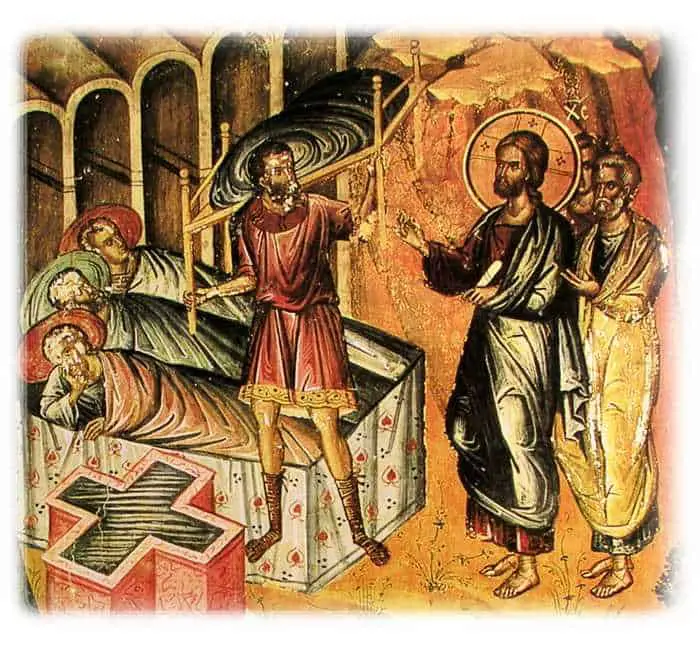
With His one word alone, the Lord healed an invalid who had lain for 38 years near a healing pool, hoping to be made well, but vainly. And raising him up from his sick bed, He cautioned him respecting the future: “Sin no more, lest a worse thing come unto thee” (St. John 5:14).
With these portentous words, the Lord indicated that the cause of the unfortunate man’s fearful infirmities lay in the sins who had previously committed. In addition, he warned that sin inevitable brings with it not only such dire disease as paralysis, but even more dreadful ills.
“Sin no more!” — it is the words of Christ’s warning that should be the principle, founding motto, of our human existence. He who forgets this great God-given truth will have vainly wasted his efforts in making his own life as well as the lives of other people peaceful, joyous, prosperous, and happy. He who loves sinning will inevitable sooner or later fall prey to the oppressive affliction of the spiritual and physical feebleness. The sufferings of body and of soul will be his lot, and in the life hereafter — everlasting, unremitting torment.
Is it not in this position of the inform man, lying helplessly by the Sheep’s Gate pool, that all mankind finds itself today, madly rejecting Christ the Savior, refusing to acknowledge the existence of sin as such, and seeking various paths of life and salvation other than those which Christ, Our Lord, point out to us?
Sin reigns ruthlessly among the people of today, smiting both the body and soul with its death-wielding venom. And for so long as sin maintains its dominion, there can be no liberation or deliverance from the world from all the evils that best it, and it is even meaningless to talk of its prosperity and preservation.
It would seem that experience in life should long since have made this clear and comprehensible to everyone, but Alas! engulfed in the depths of sinful life, led about by diabolical pride and culpable self-love, self-confident people, who put their trust in themselves alone, easily forget the lessons which life itself teaches them, and no matter how many blows they receive in the course of their existence, whereby the Lord Himself instructs them, nevertheless it is frequent among them that, as God’s Word instructs us, “according to the true proverb, the dog is turned to his own vomit again; and the sow that was washed to her wallowing in the mire” (II Peter 2:22).
According to Church tradition, that is exactly what happened to the invalid upon whom the Lord had shed His bounty. He did not heed the warning, “Sin no more, lest a worse thing come unto thee.” The lesson for the fourth week after Pascha, the week of the invalid, says that this infirm man, so wondrously healed by the Lord, was the very man who struck Our Lord Jesus Christ upon the cheek during the trial before the High Priest (St. John 18:22), for which he obtained “a trial worse than the weakening of limbs”– that eternal fire, not for eight and thirty years alone, but unto time everlasting, should torment him.”
You see to what extreme can come to those who do not remember the mercy and generosity of God. Pride and sinful self-esteem can lead the person who is unmindful of himself to the state of a madman, acting rashly, and doom him forever! The desire to ingratiate someone, to gain someone’s favor, attention, and thereby some personal reward, frequently drives those who become infatuated with their sinful selves to such truly insane deeds that trail in their wake the most frightening and incorrigible consequences!
+ Archbishop Averky, “Wherein Lies Life Greatest Evil”
